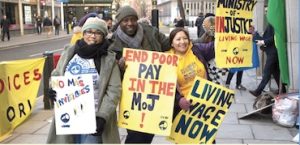Third year nursing student Dafydd Jones reflects on the campaign for pay and conditions in the NHS during the hardest year for healthcare workers in living memory
How did NHS workers’ struggle advance in 2020 over wages, funding for services etc?
2020 is of course a story of two halves, pre- and post-lockdown. Up until lockdown started the situation had become very interesting very quickly as NHS Workers Say No! emerged. NHSWSN is a grassroots campaigning organisation working for a 15% pay rise for NHS staff across the board. In a great deal of cases its membership had no previous experience of activism and the campaign hit the ground running, organising a series of well attended and dynamic demonstrations across the country. For example, in my town of Swansea, the demonstration was the largest seen in many years.
Of course, once lockdown came in the campaign was forced online and had to adapt accordingly and this change was not without its problems. Activists had to learn how to utilise online resources as well as mastering face to face recruitment and organisation in the workplace. It’s worth remembering that this was all in the face of fighting the pandemic on the front line with activists facing exhaustion and getting sick themselves.
What role did rank and file workers play in the advance?
In short, pretty much all of it. The unions have been conspicuous by their absence for most of the campaign, (they were virtually invisible on the demonstrations here in Wales), and the campaign has been fought almost entirely by the rank and file. When the unions did get involved with pay demands, they were higher than expected and it’s my opinion that the work of grassroots campaigners influenced this.
The campaign is now at the stage where we are attempting to firstly increase union membership on the ground and secondly, start to push for industrial action within the unions themselves.
What role did Nurses United play in the struggle?
Nurses United are a more permanent organisation that NHSWSN and as the name suggests are concerned with the issues facing nurses, nursing assistants and nursing students in particular rather than the NHS is general. Having said that, Nurses United have all been heavily involved in the NHSWSN campaigns and have been leading activists within it.
What about student nurses?
Unfortunately, given the way nursing courses are structured, student nurses have been wary of being publicly involved in the campaign for fear of drawing negative attention that could impact on their signing off process. However, recent events have stoked the student’s anger. Last summer 2nd and 3rd years were invited to opt into an extra-long placement to assist qualified nurses in the fight against the pandemic and be paid for doing so. Overwhelmingly, students took this offer up.
This year, with the pandemic raging on, the Nursing and Midwifery Council, (NMC) have cleared the students to repeat last summer’s process by adopting emergency protocols. However, the Chief Nursing Officer in Wales has declined this offer. This means that Welsh student nurses will still have to go to placements, risking their lives, whilst not being paid, even though the mechanisms are in place to do so. In addition, any sickness student nurses accrue through COVID via infection or having to isolate, will need to be worked back at the end of the course, again for free.
Students have reacted to this with fury at what they perceive to be an insult to all the work that they have already put in on the wards. The main nursing union, the Royal College of Nursing, (RCN) have done nothing but assure us “they understand our concerns”. Discussions are now underway in the nursing schools as to a next course of action to force the Chief Nursing Officer to reverse her decision.
Which were the most important moments of 2020 for NHS workers?
I think the demonstrations in the summer were a real eye opener. I don’t think that anyone involved expected them to be as large and angry as they were, and it showed activists the potential that the campaign had to be successful. It’s worth mentioning again that the majority of these activists were new to campaigning and it gave everyone such a jolt in the arm and a sense of belief that we were not on our own and we could be successful.
However, on the flip side, the second wave has left the campaign either online or working on the wards and clinics. The latter has become increasingly hard as workloads have risen exponentially due to staff sickness, demoralisation and sheer exhaustion. People are so run off their feet at work that there is little time or opportunity to discuss the pay issue or the campaign.
There is an international struggle by health workers, for example in Belgium and France. In what ways do you think it is possible to make links and common actions with them and what would be the first steps?
Just before Christmas NHSWSN managed to make initial links with the Belgian organisation La Santé en Lutte, (Health in Struggle), who in turn have links with similar French organisations. It is clear that their campaign is far more developed than ours in Wales and we are keen to learn from their experiences and adapt their strategies to our fight here. As I say, these links are very much in their infancy for us but having discussed them it is clear that NHSWSN are keen to develop them in the New Year to our mutual benefit.




